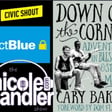Become a Creator today!Start creating today - Share your story with the world!
Start for free
00:00:00
00:00:01

FTMB Episode 12 - Nona Lee
Follow the Moneyball Episode #12 an interview with the amazing Nona Lee, Founder & CEO of Truth DEI, a consulting firm helping organizations determine current and future growth opportunities and strategies in the areas of DIVERSITY, EQUITY and INCLUSION. Nona previously served as Executive Vice President/Chief Legal Counsel for the AZ Diamondbacks as well as Vice President, Associate General Counsel for the Phoenix Suns following a distinguished career in Corporate law. A former NCAA d-1 athlete herself, Nona has a wealth of knowledge and experience that we only scratched the surface of. I look forward to a follow up interview with Nona in the near future.
Transcript
Introduction to Follow the Money Ball
00:00:02
Speaker
Welcome to Follow the Money Ball, a podcast at the intersection of sports and money. Here's your host, David Sloan. I'm David Sloan and I have opinions. I also have 44 years of experience as an agent for MLB players that back those opinions up.
Introducing Nona Lee
00:00:19
Speaker
My guest is Nona Lee. Nona is the founder and CEO of Truth, BEI, consulting, diversity, equity, and inclusion.
00:00:29
Speaker
He is also the former executive vice president and chief legal officer of the Arizona Diamondbacks and former senior vice president and general counsel of the Phoenix Suns. Welcome to Follow the Money Ball, Nona. Thank you, David. I appreciate you having me on. I just want to make one clarification is that I wasn't SVP and general counsel for the Phoenix Suns. I was associate general counsel and VP for the Phoenix Suns.
00:00:56
Speaker
I don't want to take credit for something that I didn't do. So just wanted to. I understand.
Nona's Early Life and Athletic Background
00:01:01
Speaker
So you grew up in Los Angeles. Which high school did you go to in L.A.? I went to St. Mary's Academy, which is a private all girls Catholic high school in Inglewood. You know, not too far from the Forum, for those of you familiar with that. The Fabulous Forum. The Fabulous Forum. That was where I grew up. That was sort of my neighborhood. I grew up just a couple of miles east of there. And was it fabulous?
00:01:26
Speaker
It was fabulous. I loved growing up in LA. I loved going to Lakers games at the farm with my dad. He used to take me all the time. And yeah, just growing up in LA was amazing. Close to the beach, it wasn't as crowded as it is now and as it eventually became, which is part of the reason I left. But it will always hold a very special place in my heart. I still think of it as home in some ways.
00:01:56
Speaker
I'm sure, I'm sure, and I no doubt it has changed a lot. Certainly growing up in Los Angeles gave you a tremendous advantage in terms of you no doubt in your athletic career faced some outstanding competition. And I have to imagine that prepared you well for your time as a basketball player at Pepperdine.
00:02:22
Speaker
It did. I mean, I started with athletics very early in my life, including starting as an AAU swimmer and water polo player and learned a lot about
00:02:35
Speaker
you know, being an athlete on an individual basis and as part of a team and what all of that meant and all of the things that went along with that, you know, back in that time in LA in terms of being, you know, the first black person on my team and what came along with that or who didn't stay for that because of that. And then, you know, it was great competition playing basketball at,
00:02:58
Speaker
growing up and then at St. Mary's where I went to high school and then on through college at Pepperdine. It was really a wonderful experience and it really helped set the tone for who I would later become and how I would move through my life. Were you playing in the front court or the back court? Oh, always the back court. You know, I was a two always. I was the shooter. I love playing defense. Defense was my game.
00:03:28
Speaker
So you weren't in there throwing elbows? Well, if I had to be, I would. Yeah, I will say that I remember one game in college where our center was out or on the bench or something. And my coach had me guarding the center on the other team because I was good at defense. And I like to get in there and mix it up. But, you know, I was much more comfortable offensively outside, you know, hitting the outside shots or finding my open teammates.
Value of Athletic Experience in Careers
00:03:57
Speaker
I understand you mentioned the Lakers. I don't know if you recall a player by the name of Paul Stovall, who was a former number one draft choice for the Lakers who played at Arizona State. And Paul was six foot four and used to jump center at the beginning of the games and half times. I remember the guy's name Brigham Young had a guy
00:04:19
Speaker
Big seven foot by and Stovall jump center against him at the beginning of the game and out jumped him got the tip. So, uh, sometimes those, those, uh, smaller people will definitely surprise you. I just want to say it's always been my philosophy that it's not about the heart. I mean, the height, it's about the heart, right? I appreciate that. No problem. No problem. So, so tell me this, um, taking a bit of a turn.
00:04:47
Speaker
But staying within the concept of your sports career as a player. And with all the experience you've had in the corporate world as well, I'm certain that you had to recruit slash interview, hire people to come work with you. And now in your consulting firm, I'm certain you deal with this all the time. Do you find that former
00:05:16
Speaker
athletes make better, for lack of a better term, candidates for job openings than people were not because they know what it's like to sacrifice, to achieve a goal. They know what it's like to be a team member, et cetera, et cetera. Would you agree with that idea or is it just not fanciful?
00:05:38
Speaker
No, I agree with it as a general concept, but I don't think it's necessarily absolute. And what I mean by that is there are other people who build those same intangible skills in other ways. Perhaps they were a musician or something like that where they had to learn discipline and teamwork and getting up and practicing early in the hours. But as a general rule, yes, I do believe that to be the case because of all of the intangibles that we get.
00:06:07
Speaker
from being athletes, from teamwork, discipline, determination, learning to lose, but learning to win gracefully as well. But all those things translate directly into business and also the competitive desire and the desire to get in there and work hard and not be afraid of working hard in order to accomplish your goal.
00:06:34
Speaker
Well, I can tell you the lesson that I learned most intently from my athletic career was I didn't like being yelled at. And finally, it wasn't until my senior year in high school when I started playing sports when I was
00:06:53
Speaker
you know, on teams and organized leagues. When I was nine years old, now they've got leagues, you know, six and seven, but at any rate back then in the stone ages, you weren't playing in, um, organized leagues until you were nine years old. So from nine till 17, it just drove me nuts. And, and finally at 17, I had a football coach who pulled me aside, grabbed me by the face mask and said, you don't like being yelled at, do you? And I said, no.
00:07:21
Speaker
I said, I don't like it at all. And he said, well, understand this. When I stopped yelling at you, that means I've given up. And I took that to heart because you really need to fear about somebody.
00:07:36
Speaker
to put that effort into it, to try and try and try to correct them, to teach them, to educate them on what it is you want them to do, and particularly when you're the more experienced individual. And that's something that carried over into my business career because it taught me to listen.
00:07:59
Speaker
I think I think that's a great point. I mean, I had many coaches who were who were yellers similarly and I didn't like it. Did it serve its purpose? Absolutely. But, you know, when I think about this and translate it into the workplace as well, you know, it also taps into or, you know, takes us to that concept that if we want people to
00:08:25
Speaker
to excel and to thrive, we need to know what it is they need in order to be their best and do their best. And that's not being yelled at for everybody, right? But yeah, I hear you. I didn't like it either, but the goal was accomplished. Well, and I think that's one thing that separates the good coaches
00:08:49
Speaker
from the great coaches. Good coaches can motivate you by yelling and telling you that you suck, whereas a great coach knows the guys who can be motivated by getting kicked in the ass and knows the guys that can be motivated better by patting them on the back.
00:09:11
Speaker
Exactly. The great coaches and the great leaders. Yes, without a doubt.
Conversations on Racism and Its Impact
00:09:17
Speaker
So you mentioned something else that piqued my interest and I want to at least touch on it.
00:09:26
Speaker
You said that there were several teams that you played on where you were the first black player that had played on that team. Can you speak to that experience and what was that like? Were you accepted? Were you harassed for lack of a better term? Were you called names? Well, and fortunately it was really only one and it was a start of my competitive.
00:09:48
Speaker
athletic career and that was when I tried out for the AAU swim team when I was 12 years old and I tried out and I made it and I was so excited you know the place was just full of kids and it was buzzing and I was really excited to get started and my dad took me back the next day and
00:10:10
Speaker
there were like half as many kids there and I sort of asked what was going on and was told that by the coach that you know about my dad who told the coach had told that about half the kids had quit because their parents didn't want them swimming in the pool with me.
00:10:27
Speaker
In LA? In LA, in LA. And this was in the early to mid 70s, early 70s. And so people are always surprised by that. But yeah, in LA in the 70s. And so people make assumptions that racism and hatred don't exist in places like that that are supposedly protect, you know, really, you know, more
00:10:58
Speaker
forward thinking, but, you know, those things exist everywhere. And so for me, that happened to me when I tried out for the swim team and I was hurt. I was really hurt. And I told my dad, well, if they don't want me here, I don't want to come back. And he said, do you want to swim? I'm like, yeah, I do. And he said, well, you earn the right to be here. So if you want to be here, then we're going to be here. And so I stuck it out. And, you know, the kids had stayed.
00:11:28
Speaker
were clearly more open to it. And yeah, eventually I was accepted. I was another teammate and, you know, was invited to spend the night at people's houses, but it was a tough lesson to learn early on. Not my first lesson like that, but first one in sports. And fortunately it didn't repeat itself as I went through my basketball career. Well, first of all, yeah, I'm shocked.
00:11:55
Speaker
And the reason that I'm shocked is not that I don't think racism exists everywhere, because I know it exists everywhere. My best friend in the world is black. And I'm not the first black person that I've ever been friends with. But I would have thought in Los Angeles, the racism would have been a little bit more subtle, for lack of a better term, as opposed to down here, where I grew up in Florida,
00:12:24
Speaker
The junior high that I, my elementary school, 100% segregated. My junior high, 100% segregated until my ninth grade year, my last year there. And what was particularly ironic about that was my junior high was on one side of the street and the other side of the street was the black section of town. And there was not a single black student in my school
00:12:53
Speaker
until I was in ninth grade and then there was I think two and then there were you know half a dozen in eighth grade and several more in seventh grade because that was when they first started integrating down here in the south. So it was blatant here. It was absolutely blatant. I can remember traveling on the Florida term pike which I don't know how
00:13:17
Speaker
much traveling you've done around the state of Florida, but it's one of the main arteries throughout the state. Now, unfortunately named the Ronald Reagan Turnpike, but that's a story for another day. And I can remember being there with my father and seeing that there was a white bathroom and a colored bathroom. And I asked him what that was about and he had to explain that to me. And I was seven, eight years old at the time. So here it was in your face. Yeah.
00:13:43
Speaker
I figured LA, it would not quite so much be in your face, so that's why my jaw dropped when you said that happened. I mean... I understand and that's why it was so shocking to me because I think for the most part it was very subtle.
00:14:01
Speaker
In Los Angeles, but. And this was in a way, subtle for them, right? They just didn't show up and took their kids out of the program because I was there. But yeah, you know, I grew up spending my summers in Nancy's Mississippi and I know that in your face kind of. Oh, gosh, I guess racism and.
00:14:23
Speaker
You know, so it just shows up in different ways and different forms. And, you know, when I look back on it, you know, swimming wasn't a sport where there were just a lot of, you know, there wasn't a lot of diversity. And so people didn't know how to, hadn't had to deal with it. Didn't want to deal with it. Didn't know. Yeah.
00:14:43
Speaker
I didn't want to take responsibility for that and came with their own stereotypes, etc., and their own fear and their own hate, but I didn't experience that in basketball because basketball was a sport that was very diverse.
00:14:59
Speaker
very integrated. And so to some extent, I think it really depends on, and we see that today, right? And, and, and major league sports, even, you know, baseball versus NBA, right? Yeah. That, you know, some sports are just not, uh, as, as diverse and as open to diversity and it takes time to get there. And yeah, fortunately we're seeing a lot of movement in those areas these days and some effort were,
00:15:28
Speaker
intention at least to do that.
00:15:31
Speaker
Unfortunately, they're lagging way behind in terms of management positions and baseball, in my opinion, has gone backwards.
Nona's College Experience and Career Choices
00:15:41
Speaker
I mean, when I was a kid, so many of my favorite players were black players. Now there's just a handful in the big leagues. Let me ask you another question about your athletic career. You mentioned that you didn't experience the same type of bigotry as you went on and played basketball.
00:16:02
Speaker
Would you, would you posit that perhaps a part of that may have been because you were one of the better players as well? Because obviously, you know, doing well enough to have gotten a scholarship to a D one school like Pepperdine, you had to have been a damn good player. Um, and oftentimes damn good players, uh, are, are, are able to live by a different set of rules. Yeah. Um.
00:16:32
Speaker
Maybe. Here's why I'm not completely on board with that. I walked on at Pepperdine. I didn't go in there with the scholarship. I wanted to play and I walked on and I earned my scholarship and I earned my spot on the team.
00:16:48
Speaker
Um, and kept it, uh, for, for those four years. So yes, I was a very good player, but I was also a very good swimmer. I became a very good swimmer because I stuck it out and had the opportunity. And I was a junior Olympic medalist. I mean, and so, you know, to answer your question, did my abilities change perceptions and disarm people and, you know, perhaps make them think about the stereotypes they had about me when I got there?
00:17:17
Speaker
Absolutely. So did I see change over time as people saw in the swimming world, how good I was, yeah. But there was that in basketball too, but I think really with basketball, it's just been more, it's been integrated for longer.
00:17:39
Speaker
I didn't even think about it with basketball. We were all there to do the same thing. We were a diverse team. We all just accepted each other because we all brought something to the table that mattered, something that benefited the team. And that's what was important. Then we became family.
00:17:57
Speaker
was what mattered. Eventually that happened, as I said, to some extent in swimming, but it's just a very different dynamic because swimming was not really integrated. It was not diverse at that time, much like you're talking about Major League Baseball having gone backward. Well, swimming hadn't gone forward yet.
00:18:16
Speaker
And I was in some ways at the front end of that as a black person. And you're seeing more black swimmers just excelling now. And I'm happy with that because it's really, there'd probably be more if there were more access and, you know,
00:18:38
Speaker
everybody can swim if they want to. It's not about what race you are or anything else, but there's just this sometimes in sports sense of elitism. And I think sometimes people don't even realize it's happening because they don't see who's not there. True. And a lot of people can't see past the end of their own nose. It's all about them. Tell me something. What is it that made you choose Pepperdine?
00:19:05
Speaker
Of all the schools in that area, assuming that one of your factors was proximity, having grown up in Los Angeles, what was it that made you choose Pepperdine? The other factor really was my high school teammate had been recruited by them out of school.
00:19:23
Speaker
And I loved playing with her and wanted to continue to play with her. She's an amazing player. We're still friends today. Desiree Marcelin. And I love she was a fantastic player. We clicked together. She was a one. I was a two. And she was up there and she was telling me about it. So I thought, well, this is perfect. You know, I had an opportunity. And sometimes I do second guess this to go play for Yale on the scholarship.
00:19:49
Speaker
Um, and I decided to stay there and, you know, the proximity and, uh, also to play with someone who I really enjoyed playing with and, and keep that, uh, sports relationship going and building on it and seeing where we could go with it. Well, obviously it worked. Obviously it works. So, so you played ball at Pepperdine and, um, you got your BA in broadcasting.
00:20:14
Speaker
I did. I thought I was going to be Robin Roberts before Robin Roberts was Robin before she was a sportscaster. That was my dream. Um, and it just didn't, I ended up on the business side of the entertainment industry and just couldn't break through on the talent side. So, um, you know, I, I, I worked in the, on the business side for awhile, um, about eight years before dipping my toe into the law. So you worked in, when you say business side, business and sports.
00:20:43
Speaker
No business in on the broadcast side on the broadcast on the entertainment side. We should say I started out working for a national television advertising sales firm Blair television back in the day. And then I went to kiss FM AM radio, Rick D's in the morning.
00:21:02
Speaker
Oh, really? Yeah. I worked as a personnel director and credit manager. And, you know, at that point in time, just decided that this isn't really what I want to do. And I'd been intrigued with the law. I grew up working in law firms. My mother was a legal secretary, but I didn't like lawyers. So it was really a bit of a conundrum for me. I understand. But I decided to become a paralegal and dip my toe in the water. And I fell in love with the law and then went to law school.
00:21:31
Speaker
Interesting. My wife got her degree in broadcasting as well. That's why I wanted to ask you about it. But unlike yourself, she stayed in it and has been on the air and behind the mic as well as a producer. I don't know if you recall the Mark and Brian show in Los Angeles. I do. She produced that show for five years. That's phenomenal. She was a producer in New York.
00:22:01
Speaker
But one of the few people that I know who actually did what their college degree said they are going to be doing, most people that I know get a degree in something and they use that as a springboard to go on to something completely unrelated. So you worked in business and you decided to, as you put it, dip your toe into law and then decided to go full on into law.
Transition to Sports Law
00:22:30
Speaker
Now, when you first passed the bar, you were in private practice? I was. I was working for what had become a small firm. Six weeks before graduation, it was a major firm and it blew up. And the smaller version of it honored my offer. And so I came out as a litigator for a firm here in Phoenix. And were you doing more, let's call it business type of things? Were you litigating?
00:23:00
Speaker
I was litigating as primarily, I was doing some commercial litigation, but primarily, um, personal injury and medical malpractice with an emphasis on wrongful death claims. But I did do some commercial litigation. I was involved in the tobacco litigation back in the day and all of that, but, um, no, not doing too much on the business side then. I understand. So how did you move from there?
00:23:29
Speaker
into working in sports because tobacco litigation and all the rest of that stuff would not seem to be the key to a future in sports business. Yeah, you know, when I was in law school, I had no idea there was an opportunity to work as a lawyer in professional sports. It wasn't on my radar at all. And then what happened for me is the WNBA started
00:23:57
Speaker
And all I could think about was how can I merge my practice with my passion for sports? How can I get a job working with the WNBA? And a woman who had been on the business side of the firm, she was a transactional attorney, she had been a year ahead of me and she'd left. And as it turned out at the time, she was the general counsel for the Suns. And so I called her and I said, hey,
00:24:26
Speaker
How do I do what you're doing? How do I break into the sports world as a legal practitioner? And she basically told me I was not qualified because I really needed to be a transactional practitioner if I wanted to work in-house with a team because I'd already researched being an agent. That wasn't really.
00:24:45
Speaker
for me, I didn't think. And so having heard that from her and having talked to the managing partner at the firm I was at about starting a sports law practice, Aaron, he said, no, I did the only logical thing you can do. And that's, you know, interview with the firms in town that represented the teams and with the goal of starting over.
00:25:07
Speaker
as a transactional attorney. And I got an offer from the outside counsel firm for the Diamondbacks. So wait, you were still in Los Angeles and you had moved to Phoenix. I came to Phoenix out of law school. I never went back. Oh, okay. I didn't know that. Yeah, I'm sorry if I wasn't clear. Yeah, I came to Phoenix out of law school. And so
00:25:31
Speaker
I was already here in Phoenix, so I researched what firms in town represented the pro teams. And I got an offer from Gallagher and Kennedy, which was the outside counsel firm for the Diamondbacks. And I'd been very clear about what my objective was. And about a week after I accepted their offer, they asked me to come down and talk to them. They told me that the son's general counsel, the woman who I'd spoken with, was leaving.
00:25:59
Speaker
Uh, the sons leaving her position and asked if I wanted to interview for the position and they'd set up the interviews. And so, um, wait a minute, wait, wait, wait, wait, wait, wait, wait, hold on, hold on, hold on. She said you had to be a transactional attorney for awhile. First, how long had you been transactional?
00:26:16
Speaker
I hadn't started at the firm yet. This was before I would start it there. So what they did was they said, great. They set up the interviews. They brought me into the firm and put me with two wonderful women.
00:26:33
Speaker
Attorneys, one was a corporate attorney, the other is securities attorney. And I started learning transactional practice from them as I started to go through the interview process with the sons. And I believe I joined the firm in November of 99 and.
00:26:50
Speaker
I didn't get the job, the general counsel position, but a few weeks later, they decided to create a number two position, associate general counsel, and they offered that to me. So I started with the Suns on January 18th, 2000. And so, you know, when I talk about it, I talk about it as the stars aligning in some way. I was very intentional about what I wanted to do.
00:27:15
Speaker
Um, you know, it just worked out for me. So I learned. That's wild. Yeah. I thought when you said the WNBA came along that you were thinking of putting your sneakers back on and getting back out there. Oh, I did. I did think about it. Cause I was still able to do it when they first came, but I was trying to, to figure out how I was going to do that and practice law at the same time. And you know, I was an original season ticket holder with the Phoenix mercury and, uh,
00:27:41
Speaker
I was watching him play. I'm like, I could do this. I can get out there and play with them. But I never pulled the trigger. I don't have many regrets in my life. But sometimes I wonder what would have happened if I tried. But I'm still an avid fan. Still love watching it. Going to games is fantastic. I keep it right here. It's like the quote from Jim Bowden. You spend a good piece of your life gripping a baseball. And in the end, it turns out that it was the other way around all the time. Once you get in deep like that,
00:28:11
Speaker
It never leaves you. It never leaves you. But not many people practice law and a jumper at the same time.
00:28:20
Speaker
That is sure. I suppose it could be done. I just, you know, I did not, didn't try to figure that one out, but, you know, I like it. I think if anybody could do that, I think if anybody could do that, probably Steph Curry could, but that's another story. Seems like that man, seems like he can do anything. But, okay, so now you're with the sons and when you're working, were you working in negotiating contracts?
00:28:44
Speaker
Yeah, you know, first I'll say that at the time the Suns and the Diamondbacks and the Mercury were jointly owned by Jerry Colangelo and his ownership group.
Working with Arizona's Sports Teams
00:28:55
Speaker
And so I was working for all three franchises and we also had a few facilities as well. And so, yes, I was drafting and negotiating contracts. I was also utilizing my litigation skills, which always came in handy.
00:29:12
Speaker
internally as well. But yeah, drafting negotiating contracts, you know, you start small and you work your way up. And so I had a wonderful, wonderful teacher and Tom O'Malley, who was the general counsel of the the sons at the time. Well, ironically, Jerry Colangelo was the first sports executive that I ever spoke to in my career as an agent.
00:29:37
Speaker
My very first client was a man by the name of James Brown, who played basketball at Arizona State. And James was a buddy of mine. He was the roommate of another close friend of mine, Bump Wills, who played baseball on the baseball team at ASU. And I had two roommates that played on the baseball team. I had gone out for the baseball team at Arizona State, not because I thought I had a prayer of making it. For me, it was like a fantasy camp that I didn't have to pay for.
00:30:07
Speaker
I will give myself the following credit. I made it to the next to the last cut. But nonetheless, I was so far over my head, it wasn't even funny. But at any rate, James got declared ineligible.
00:30:20
Speaker
He figured he could get away with not going to class his senior year, the end of his senior year, uh, fall semester. Cause as you know, basketball starts in the fall, but it ends in the spring. And he figured by the time they caught up with him, basketball would be over and he didn't care. Well, he got caught and got declared ineligible. He asked if there was anything I could do to help him get into pro basketball.
00:30:45
Speaker
And I just figured I'd always been good at writing and speaking. I'll give it a shot. Wrote letters to every team in basketball. But again, the Suns, and we're talking, this was 1974. So the Suns were just down the road. So they were the first team that I actually picked up the phone. I can't remember where, obviously the computers didn't even exist back then. I can't remember exactly where it was. I got the number. I think it might've been from the sporting news.
00:31:12
Speaker
or the executive offices of the sons, I picked up the phone and called and asked for Jerry Colangelo. And they said he was busy. What's this about? I explained it to him to make a long story short. About a week later, James and I went to where they were playing, which is Veterans Coliseum, where they have the Arizona State Fair. And I met Jerry Colangelo. So here I am.
00:31:38
Speaker
This is 1973. I hadn't earned 22 yet. And I'm shaking hands with Jerry Colangelo, which was really pretty cool. And he said that he would do what he could to see if he could find a spot for James. Because, you know, ASU guy at the very least, it would, you know, get a little bit of publicity in the Arizona Republic.
00:32:04
Speaker
And in the meantime, before they could even get back to me, I got interest from the San Diego conquistadors. And James and I drove over to San Diego and he had a try out there, but got an even better offer for him from the Virginia Squires. And in the meantime, he had introduced me to another ASU alum by the name of Mike Hopwood.
00:32:27
Speaker
who was, I don't know if Mike was from Inglewood or Compton, but he was from that same general area. And I got him a contract with the Virginia Squires. And interesting story in regard to what we're talking about earlier in regard to subtle versus overt racism. The three of us hopped in a car in Phoenix, we're driving to Norfolk, Virginia.
00:32:53
Speaker
We drove straight through because we had three people driving. We're in Arkansas and we're starving. So we stop at this diner in who knows where Arkansas.
00:33:03
Speaker
So we walk in, here I am, 5'11", you know, Jewish guy with James Brown, who was from Greenville, Mississippi. So that's where he grew up. And, you know, that was his world more or less. And James was 6'3", very close cropped hair, very, you know, kind of on the quiet side. Mike Hopwood coming from LA, 6'7", giant fro.
00:33:29
Speaker
And you know, the attitude to go along with it. And we go in there and I'm just, I got my head on a swivel. I tell you, I have never eaten so fast because the people in that diner looked at us as if we had just walked off a spaceship.
00:33:45
Speaker
It was. Did they serve you at least? Oh yeah. They, they, they served us, they served us, but, um, reluctantly. And I'm telling you, I just about ate a burger in one bite and it's like, let's get back in the car. Let's get back in the car. So that was an interesting experience. But, um, then, you know, like I say, we went on to Virginia. Unfortunately they didn't make it, but that was the beginning of my agent career. So it was kind of like what you were saying earlier in regard to the stars aligning.
00:34:15
Speaker
It was one guy introducing me to another guy, introducing me to another guy and my having gone out for the baseball team at ASU, which had the most talent on the planet as far as college baseball was concerned and getting to know those guys and not to represent some of them. So at any rate, so now you're with the sons, you're involved in, um, negotiating contracts, you're involved in other business areas and you're loving it.
00:34:42
Speaker
You really enjoyed it. Was it everything you hoped it would be absolutely loved every minute of it. I, you know, literally thought I'd died and gone to heaven. It was my dream job in every sense. I loved working.
00:34:57
Speaker
Uh, for Jerry, uh, he was a wonderful leader. Um, it was just, it was a wonderful, wonderful time. And I also love working with the other teams, you know, getting to work with the mercury. I got to work with them and turn in terms of some of their, um, a liaison with the fans, which was fun. And you know, in addition to my legal work and with the Diamondbacks doing legal work for them as well.
00:35:20
Speaker
So it was really more than I could have ever asked for. And I enjoyed that for five years, ultimately became Vice President there and Associate General Counsel.
00:35:31
Speaker
And then Jerry sold the teams to, you know, the sons to Robert Sarver and Ken Kendrick took over the Diamondbacks as managing general partner. Jerry having sold his interest in that team as well. And so, you know, I sort of saw the writing on the wall. And, you know, I didn't expect that my boss, Tom, would be leaving anytime soon. And the Diamondbacks had never had dedicated in-house counsel. They never had their own legal department.
00:36:00
Speaker
Since they're about 50% of my practice and I enjoyed working with them, I asked for the opportunity to go start their legal department down there and was given that opportunity in 2005 and built it over the next 17 and a half years. And that was after the championship team they had with Randy Johnson and Schilling and those guys.
00:36:20
Speaker
Yes, I was after the 2001 World Series. I was working for them then, but providing shared services. So I do have my World Series rig. I was at some of those games, especially game seven, I'll never forget. What a series, especially with everything that had happened in New York. And it was just, it was tough. It was wonderful at the same time for the Diamondbacks franchise, but you know,
00:36:50
Speaker
I felt bad for, for New York in a way because they could have used that to lift them up, but still they were, they were in the big show in the game and they gave them to, to really focus on besides tragedy for a while. And that was good. How involved were you in the negotiations in regard to the stadium that was built downtown? I wasn't because I wasn't with the franchises then. Okay.
00:37:16
Speaker
Yeah, I joined. The baseball stadium was built in 1997. It opened in 97 for 98. I can't remember one of the two. I can't remember right now. And I didn't start with them to 2000. Okay. I thought it was after that. Oh, no, no. I was very involved in the negotiations for the building of our spring training facility out at Salt River Fits on the Salt River Pima Maricopa Indian community. And that was a fun negotiation because it's a nice facility too.
00:37:46
Speaker
beautiful facility and it was an interesting negotiation because you know you're dealing with a tribal nation which is you know almost like dealing with a you know on an international basis where I was a sovereign country
00:38:02
Speaker
Yeah, sovereign country. And so it was, you know, fun. It was challenging as any negotiation of that nature would be, you know, worked closely with outside counsel to lead us through that. And from a legal perspective, when we got it done, I also did the same with respect to or was working on it when I left the building of a new academy in the Dominican Republic. But I had been
00:38:29
Speaker
negotiating leases down there for a while, but also negotiated the working with our outside council down there, the purchase of a new property and land in order to build a new academy down there as well. So yeah, I had some fun deals. Oh, it's a different world down there too. I mean, I've been involved in some financing on the player side with people in the Dominican and
00:38:58
Speaker
Um, let me figure out how I can say this in a nice way. Um, they tend to figure things out as they go along, but how about that? Um, as opposed to here where, uh, if a player's looking, for example, for a loan or a mortgage, it's like, okay, you got to fill out this form and make this application. And it's a definite step there. As I say, they, they tend to make things up and they go along. Yeah. It was, it was, um.
00:39:28
Speaker
Uh, quite a journey and, and it was, it was fun learning it. And before I went down, one of my colleagues who had been going down there for years, uh, the vice president of finance, um, Craig Bradley, you know, told me that things are done differently there. And, you know, it was a great lesson to learn because, you know, it's, it's about respecting the culture that you're going into and learning to work that they learned, they work.
00:39:53
Speaker
And it was wonderful. It was fun. And the DR will always be close to my heart from those experiences and the people who are down there.
00:40:03
Speaker
It really ties back to the work I'm doing now in terms of understanding different cultures. Well, let's talk about that. So you said you were with the original, originally you were with the ownership group that owned the Sons, the Mercury, and the Diamondbacks, and then that split up and you were exclusively with the
Shifting Focus to Truth, BEI and DEI Challenges
00:40:27
Speaker
Diamondbacks. So your entire tenure with the Diamondbacks was 17 years. 17 years.
00:40:32
Speaker
you decide to leave there, which I have to assume was a fairly secure position. You could have been there arguably for the rest of your life. Was that motivated because you had this other
00:40:52
Speaker
box you wanted to check off on your bucket list, was it at least in part because you felt you were in a box that you didn't have the chance for advancement, perhaps that you might have in another area because you might not get the opportunity to transition from
00:41:13
Speaker
Let's say corporate counsel to general manager or something like that. What was it that that caused you to make the move to truth? Yeah, it was a couple things. David first. Let me say that I thoroughly. Enjoyed my time at the Diamondbacks. I work with some amazing people and.
00:41:35
Speaker
What happened for me was this in 2000, after George Floyd was murdered, like many other organizations, the Diamondbacks, and I was very, very happy about this and so proud of the organization decided to be very intentional about DEI and form a.
00:41:52
Speaker
you know, really get into making it a part of the organizational culture. And being, you know, the most diverse person on the executive, on the leadership team, and the only diverse person on the executive leadership team, I asked for the opportunity to lead those efforts. And so I started doing that in addition to my duties as EVP and chief legal officer, including, you know,
00:42:21
Speaker
while I'm working and we're going through COVID, you know, putting myself through E cornell certification program to be sure that I had the credentials to go with my many years of lived experiences. And so I was doing both jobs and I'm not someone who does anything half halfway. Right. And so it was a lot.
00:42:41
Speaker
It was a lot, honestly, and it started to impact my health. I got out of bed one day and just went face down on the tile floor, just huge concussion. Seriously? Yeah, it was just stress. Honestly, I had no intention of leaving the Diamondbacks really for another few years.
00:43:05
Speaker
You know, retiring from working altogether, they're probably to the extent that I'm capable of retiring. But I decided that was just an eye opener for me. And yeah, I've been really, really good about was succession planning. And, you know, I'm sorry for laughing. I'm sorry for laughing, but all it took was a hit in the head.
00:43:25
Speaker
Well, I felt like the year before, I almost died during the surgery. I almost split out on the table. They they last ready to vein. So there was that. And it has you thinking about, well, what is my purpose in life? And then you get out of bed a few months later and land, you know, and crack your head and get a severe concussion. And you have to start thinking about, you know, what am I doing with my life, you know, and what should I be doing? Am I doing what I should be doing? And
00:43:51
Speaker
I had to evaluate things and as I was saying, you know, I had done a great job of succession planning. Caleb J had been with me as Associate General Counsel and then General Counsel for 15 years and he was ready to step in and
00:44:07
Speaker
I thought, you know, I don't know how much longer I have on this planet, but however much time it is, you know, I want to be sure I take the time and space now to make a difference in a significant way. And I'm loving both of my jobs, but Caleb's ready to do this one.
00:44:26
Speaker
I think I'm needed here for now. And so I decided to leave and focus on this. And, you know, it's tough because it was a very secure job, you know, very comfortable financially and just in terms of where I was in my career. So it was a huge risk to take. And, you know, a lot of people questioned what was going on and why I left.
00:44:49
Speaker
And maybe the concussion had loosened the stage. Yeah, that too. Sort of is she brave or crazy, right? Maybe a little of both. Much like I knew when I was supposed to be in professional sports and the stars align.
00:45:03
Speaker
I felt like this is what I was supposed to be doing. Wow. And I still feel as though I have the ability to work in professional sports doing this work. I did it with the Diamondbacks and I'm talking to other sport related clients because there is a need for it. And you know, I know the sports business. I know it well. I know, I know how it works. I know
00:45:25
Speaker
what the barriers are, what the opportunities are. And my hope is to be able to add value to the sports world doing this, as I am with many other industries and businesses. Well, tell me this. And if it's something you don't want to get into, tell me that as well. But I have to ask the question. DEI is certainly not
00:45:52
Speaker
vanilla, it's not mainstream. And unfortunately, the political climate in this country is such that, particularly in certain areas like where governors are fascists, like where I live, and in Texas, it would seem that it might be a tough sell. Is this
00:46:17
Speaker
in line with perhaps what you've experienced so far in areas like Florida, like Texas, like some of the other, no other way to put it, red states where diversity is not at the top of their list in terms of policies that they are trying to implement. And I'm trying to be gentle here because I don't want to
00:46:47
Speaker
You know, I don't want to create any controversy, but I can't be talking to somebody who works in diversity, equity and inclusion and not ask this question and feel like I have any integrity in what I'm doing here because this is such a huge, huge thing. I think it's a fantastic question, David. And, you know, it's something we have to talk about.
00:47:13
Speaker
And, you know, I can start by saying I would like to, but I don't currently have any clients in Florida or Texas in particular, but I would like to, because I think there's a need for it in those places more than anywhere else, and I don't shy away from what is difficult. Or I wouldn't be doing this work, because this is hard work.
00:47:35
Speaker
Yeah, but are people nervous about it? Yes. But what I'm finding is that the people who really authentically understand why it's needed and who understand the benefit of it for their businesses are still wanting to do the work.
00:47:53
Speaker
Are they somewhat nervous about what may happen because these people are sending letters out to law firms, etc., threatening to sue them for engaging in diverse hiring and all of that? Yeah, but it's bigger than that. It's more than that. The reason that this is happening is because
00:48:16
Speaker
people are afraid and because it's working and people are starting to see the need for change and we have a very real fear of the truth sometimes in this country because it makes us feel bad or makes us feel guilty and we need to start getting
00:48:39
Speaker
Pass that discomfort because it's not like anyone is trying to make you. It's not about guilt. It's not about shame. It's about, look, this is where we are. How do we move forward together and do better together? Because this isn't fair. This isn't equitable and people haven't done anything wrong to deserve being treated this way. So.
00:49:00
Speaker
Let's be fair to everybody, right? And if you're the best person for the job, you're going to get the job. You know, it's not people aren't trying to hire. Yeah, I get this a lot. We should just hire people based on their skills, not on their race or their gender. Well,
00:49:18
Speaker
Um, yeah, that's what, you know, nobody's suggesting you hired just based on race or based on gender. You hire the best person, but be sure that you'd be inclusive of everyone in the process of deciding who that best person is, is what the goal is. Well, and, and be smart. I mean, and be smart enough to recognize a few very important facts. Number one, black people aren't going anywhere. Number two,
00:49:48
Speaker
If you're running an organization, I don't care if you are a dairy or a basketball team, your goal should be to hire the best person. Period. The most qualified person, the person that you feel that fits in the best. Now, it's also important to have your organization mirror
00:50:15
Speaker
the community that you work in and the community that you work with, so that if you are a dairy and you are selling to stores in parts of the state where it's a predominantly black community,
00:50:32
Speaker
How is it not to your advantage to have Black employees who at least give you some insight as to ways that you might be able to position your business to appeal more to people in that particular community?
00:50:50
Speaker
That's absolutely right, David. And that's something that people are missing. And one of the things that I talk to my clients about is the business, people know the business case and people have understood whether they agree with it or not, that this is the right thing to do. What I focus on as a business imperative and what that is for me is the changing world. According to the US Census Bureau, by 2044, the US population is going to be majority minority. Yes.
00:51:17
Speaker
by, you know, women are already more than 51% of the population. All the different diverse populations are growing, but not only that, with that values are changing. We have two generations coming up that highly value diversity, equity and inclusion. Millennials and Gen Z. And they're not going to work for or work with as people leading other companies, other companies that don't share those values. In addition, consumer buying power is changing. And so if you're not
00:51:47
Speaker
involving people from diverse backgrounds in your business, you're leaving significant consumer buying power on the table for the Hispanic market. I mean, that's more than doubled in the last 10 years, and that's the second largest consumer market. African-American, $1.6 trillion per year. Asian-American, $1.3 trillion a year. LGBTQ plus, $1.6 trillion a year. US immigrant-led households, $1.3 trillion a year. And women,
00:52:16
Speaker
you know, they're consuming buying power, our consumer buying power varies from 15 trillion, five trillion to $15 trillion a year. And women control 60% of the personal wealth. So businesses aren't thinking about these things. They're going to get left behind and they're going to leave a lot of money on the table in the process. And hurt their, their stakeholders in the process. Absolutely. Without any doubt. And, and sports teams, how, for example,
00:52:45
Speaker
How can the Orlando Magic, the Miami Heat, two franchises that are made up predominantly of black players, how can they not take note of this and instead of
00:53:01
Speaker
resisting it, using it to their advantage. There was a tremendous uproar, which you no doubt took note of recently when it came to people's attention that the DeVos family that owns the Orlando Magic had donated a bunch of money to the Ron DeSantis campaign. And it was the team that had donated the money, not the family, but the family is the owners of the team. And there were people
00:53:31
Speaker
from the team and people from the NBPA that said, look, this guy is working against the interests of the people that are putting on your uniform. How can you do this? Yeah. Yeah.
Conclusion and Gratitude
00:53:44
Speaker
It's, it's, it's, it's just difficult to fathom sometimes. And David, I hate to jump, but I have to lead a meeting right now for the national LGBTQ plus bar. Can you, can you give me one minute? Yeah.
00:53:59
Speaker
Okay, one minute because I can't close this without talking about how you and I first met. You and I first met because I had an issue with a former player who was trying to hurt me. And I'm going to be as general about this as possible so that I don't get involved in another legal issue. And I contacted a dozen teams.
00:54:26
Speaker
seeking information that refuted the claim that was being placed against me. There were two teams out of the dozen that didn't lie to me and say they had no information that could be helpful. Two teams. The Detroit Tigers, because John Westhoff, who you may know, was the counsel there, used to live a block away from me. And the other team was the Arizona Diamondbacks. And you were involved with the Arizona Diamondbacks. And you, who
00:54:57
Speaker
got on the phone and said, in so many words, this is gaining me nothing, but I'm going to do the right thing. And I'll never be able to repay you for that. That was so, it was kind, but even more than that, it just speaks volumes about who you are and
00:55:21
Speaker
who raised you because that sort of value comes from your family of origin. So I don't know if your parents are still around, but if they are, tell them I send my regards. Thank you, David. They did a very good job.
00:55:37
Speaker
Thank you. I appreciate that. And I'm so glad I was able to help, because that's what we have to do for each other, right? It's about caring. The right thing. I mean, I'm not trying to quote Spike Lee intentionally, but do the right thing. Do the right thing. It's been a pleasure. And sincerely, thank you. Thank you.
00:55:53
Speaker
Thank you, David. And that's it for another edition of Follow the Money Ball with your host David Sloan. To make a comment or a suggestion for a future guest, reach out to David at followthemoneyball.substack.com. Thanks for listening. See you next time.











